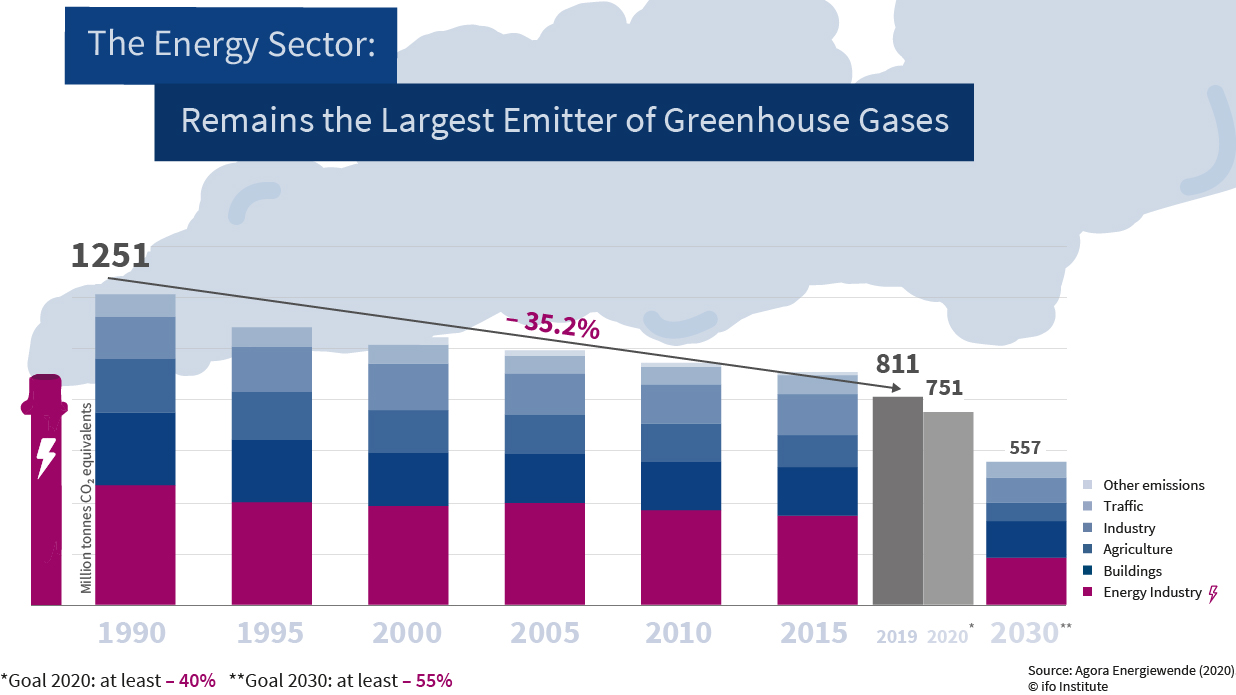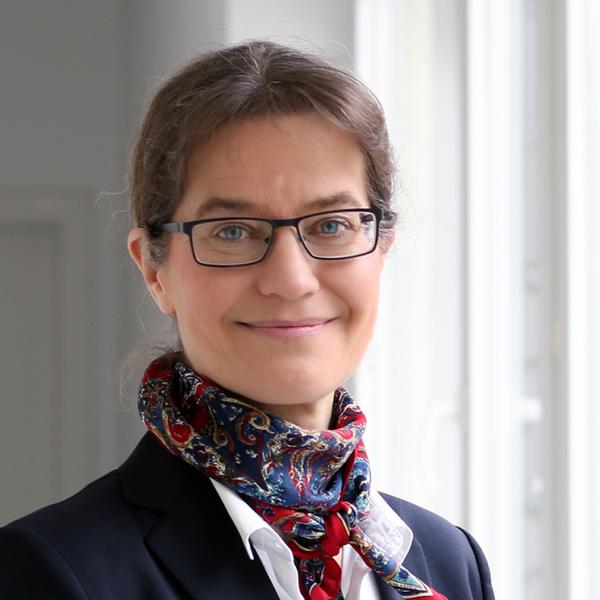Climate Policy
With the European Green Deal, European Commission President Ursula von der Leyen has defined a new growth and climate strategy. The aim of this strategy is to cut greenhouse gas emissions while also creating jobs, but there are still many questions regarding the form it should take and how to implement it. While the EU plans to achieve climate neutrality by 2050, the targets set in Germany are somewhat less ambitious: by 2050, the German government aims to drastically cut greenhouse gas emissions down to 80 to 95 percent of their 1990 levels.

The energy sector is the largest contributor to greenhouse gas emissions caused by humans, both in Germany and globally, which is why the energy transition is becoming the most important social project currently facing Germany and the European Union. Opinion is divided regarding the most effective policy instruments for efficient climate protection and the costs of the energy transition.
Putting a Price on Greenhouse Gases
Economists have been advocating the introduction of a price on CO₂ for years. Designed to apply equally to all technologies, it would provide incentives to curb greenhouse gas emissions in those areas where doing so would cost the least. There are currently various levies that determine the price of carbon dioxide emissions in Germany. However, the lack of a systematic approach has so far failed to provide the necessary incentives for the efficient reduction of emissions in almost all sectors. The eco-tax on gasoline and diesel, for example, amounts to around EUR 60 per metric ton of CO₂ emitted, whereas the same amount produced by the use of heating oil in private households incurs a charge of only EUR 8. Owing to electricity tax, emission allowances, and Germany’s renewable energy surcharge (EEG surcharge) alone, the eco-tax on electricity amounts to almost EUR 200 per metric ton of CO2. However, to achieve its climate targets, Germany would have to drastically increase its use of green electricity in the heating and transport sectors in the future. The current tax system does not provide the right incentives for this.
The Middle Ground between Emissions Trading and CO₂ Tax: Flexcap
Flexcap, a CO₂ pricing concept developed by ifo, combines the advantages of a CO₂ tax and an emissions trading system, but serves as a more effective solution than either instrument on its own. The architects of the Flexcap concept maintain that an emissions trading system by itself would pass all uncertainties on to companies and consumers in the form of price fluctuations, while a CO₂ tax alone would make it more difficult to achieve volume targets. In Flexcap, the quantity of the certificates to be auctioned depends on the price: more certificates go up for auction when the price is high, fewer when it is low. Both adjustments stabilize the price compared to an emissions trading system with a fixed cap. Flexcap reduces the uncertainty regarding price and quantity while at the same time making it possible to achieve long-term climate targets.
Major Social Projects Come at a Price
The price tag for the energy transition has been calculated for several scenarios. By 2050, systemic extra costs for the energy transition could total anywhere from EUR 500 billion to more than EUR 3,000 billion, depending on the conditions. That is equivalent to 0.4 to 2.5 percent of Germany’s gross domestic product in 2018. These extra costs seem astronomical today, but their magnitude is similar to that of other major social projects, such as reunification. How such large-scale projects are reflected in value added and employment depends – as was the case with German reunification – to a large extent on the conditions set by policy.
-
All References
-
-
Article in JournalHanns-Günther Hilpert, Bettina Rudloff, Philipp M. Richter, Joschka Wanner, Isabella Gourevich, Dorothee Hillrichs, Camille Semelet, Timo Walter, Markus Taube, Volker Treierifo Institut, München, 2024ifo Schnelldienst, 2024, 77, Nr. 01, 03-25
-
Article in JournalNicole Garbarino, Dr. Marie-Theres von Schickfusifo Institut, München, 2024ifo Schnelldienst, 2024, 77, Nr. 01, 26-30
-
Journal (Complete Issue)ifo Institut, München, 2024
-
Article in JournalSebastian Blesse, Holger Dietrich, Sarah Necker, Michael K. Zürnifo Institut, München, 2024ifo Schnelldienst, 2024, 77, Nr. 01, 39-43
-
Article in JournalReimund Schwarze, Robert Finger, Reimund P. Rötter, Mareike Köster, Klaus Müller, Theresa Hübsch, Maria Waldinger, Franziska Wintersteller, Gerome Wolf, Ulrike Grote, Etti Winter, Robyn Blake-Rathifo Institut, München, 2022ifo Schnelldienst, 2022, 75, Nr. 08, 03-28
-
Article in JournalLeander Andres, Marc Fabel, Matthias Flückiger, Markus Ludwig, Helmut Rainer, Maria Waldinger, Sebastian Wichertifo Institut, München, 2022ifo Schnelldienst, 2022, 75, Nr. 05, 28-33
-
Article in JournalClemens Fuest, Volker Meierifo Institut, München, 2022ifo Schnelldienst, 2022, 75, Nr. 05, 03-05
-
Article in JournalCarolin Formella, Yvonne Giesingifo Institut, München, 2022ifo Schnelldienst, 2022, 75, Nr. 05, 19-22
-
Article in JournalFrancesco D’Acunto, Sascha Möhrle, Florian Neumeier, Andreas Peichl, Michael Weberifo Institut, München, 2022ifo Schnelldienst, 2022, 75, Nr. 05, 11-14
-
Article in JournalNiklas Potrafke, Kaspar Wüthrichifo Institut, München, 2022ifo Schnelldienst, 2022, 75, Nr. 05, 23-27
-
Article in JournalWaldemar Marzifo Institut, München, 2022ifo Schnelldienst, 2022, 75, Nr. 05, 15-18
-
Article in JournalJoachim Ragnitzifo Institut, Dresden, 2022ifo Dresden berichtet, 2022, 29, Nr. 1, 03-09
-
Article in JournalValeriya Azarova, Karen Pittel, Katharina Ruschifo Institut, München, 2022ifo Schnelldienst, 2022, 75, Nr. 01, 82-86
-
Article in JournalJoachim Ragnitzifo Institute, Dresden, 2021ifo Dresden berichtet, 2021, 28, Nr. 6, 03-06
-
Article in JournalDaniel Osberghaus, Christian Groß, Gert G. Wagner, Frank Offermann, Christoph Duden, Jonas Schmitt, Michael Berlemann, Jörg Asmussen, Markus Roth, Lamia Messari-Becker, Nicola Garbarino, Benjamin Guin, Jonathan Leeifo Institut, München, 2021ifo Schnelldienst, 2021, 74, Nr. 11, 03-28
-
Article in JournalJan Krahnen, Jörg Rocholl, Marcel Thumifo Institut, Dresden, 2021ifo Dresden berichtet, 2021, 28, Nr. 4, 32-33
-
Article in JournalChristian Traeger, Grischa Perino, Karen Pittel, Till Requate, Alex Schmittifo Institut, München, 2019ifo Schnelldienst, 2019, 72, Nr. 18, 38-45
-
Article in JournalJoachim Ragnitz2019Wirtschaftsdienst 99 (6), 376-376
-
Article in JournalChristoph Buchal, Hans-Dieter Karl, Hans-Werner Sinnifo Institut, München, 2019ifo Schnelldienst, 2019, 72, Nr. 08, 40-54
-
Monograph (Authorship)Complex dimensions of climate policy: the role of political economy, capital markets, and urban formWaldemar Marzifo Institute, Munich, 2019ifo Beiträge zur Wirtschaftsforschung / 85
-
Article in JournalJohannes Blum, Philip Kapitzke, Niklas Potrafkeifo Institut, München, 2019ifo Schnelldienst, 2019, 72, Nr. 06, 34-39
-
Working PaperChristoph Weissbartifo Institute, Munich, 2018ifo Working Paper No. 270
-
Article in JournalGünter Knieps, Thomas Griese, André Grüttner, Oliver Rottmann, Hans-Wilhelm Schiffer, Gernot Sieg, David Stadelmann, Heiner Monheimifo Institut, München, 2018ifo Schnelldienst, 2018, 71, Nr. 09, 03-22
-
Article in JournalAndreas Löschel, Oliver Kalteneggerifo Institut, München, 2018ifo Schnelldienst, 2018, 71, Nr. 02, 14-17
-
Article in JournalSandra Achten, Christian Leßmann, Arne Steinkrausifo Institut, Dresden, 2018in: ifo Dresden berichtet, 2018, 25, Nr. 01, 29-31
-
Article in JournalClaudia Kemfert, Erik Gawel, Manfred Fischedick, Marc Oliver Bettzüge, Felix Chr. Matthes, Andreas Kuhlmannifo Institut, München, 2018ifo Schnelldienst, 2018, 71, Nr. 01, 03-25
-
Monograph (Authorship)Johannes Pfeifferifo Institute, Munich, 2017ifo Beiträge zur Wirtschaftsforschung / 77
-
Monograph (Authorship)Oliver Falck, Michael Ebnet, Johannes Koenen, Julian Dieler, Johann Wackerbauerifo Institut, München, 2017ifo Forschungsberichte / 87
-
Article in JournalAlex Schmittifo Institut, München, 2017ifo Schnelldienst, 2017, 70, Nr. 09, 48-50
-
Article in JournalFerdinand Dudenhöfferifo Institut, München, 2017ifo Schnelldienst, 2017, 70, Nr. 03, 23-27
-
Article in JournalKaren Pittel2016Energiewirtschaftliche Tagesfragen 66 (19), 33-35
-
Article in JournalJoachim Ragnitzifo Institut, München, 2015ifo Dresden berichtet, 2015, 22, Nr. 05, 43-45
-
-

